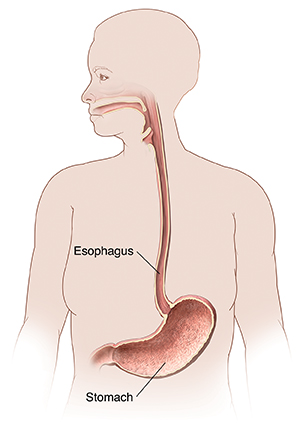A
B
C
D
E
F
G
H
I
J
K
L
M
N
O
P
Q
R
S
T
U
V
W
X
Y
Z
Topic IndexLibrary Index
Click a letter to see a list of conditions beginning with that letter.
Click 'Topic Index' to return to the index for the current topic.
Click 'Library Index' to return to the listing of all topics.
Eosinophilic Esophagitis (EoE)
Eosinophilic esophagitis (EoE) is an allergic reaction. It occurs in the esophagus. This is the tube that leads from the mouth down to the stomach. The immune system responds to an allergen by making white blood cells called eosinophils. The esophagus then becomes red and swollen. It can then get scarred and narrowed. EoE is much more common in people with asthma or allergies.

What causes eosinophilic esophagitis?
Researchers are working to understand the causes of EoE. It may be caused by allergens in the environment. Or it may be caused by food allergens. Foods that are often found to be the cause of EoE include wheat, dairy, eggs, and soy. You may be at higher risk for EoE if you have a family history of allergies or EoE. There may be a genetic link.
Symptoms of eosinophilic esophagitis
Symptoms of EoE vary from person to person and may include:
-
Trouble swallowing or painful swallowing
-
Chest pain
-
Pain in the belly (abdomen)
-
Vomiting
-
Food getting stuck in the throat (a medical emergency)
-
Heartburn
Diagnosing eosinophilic esophagitis
Your healthcare provider will ask about your health history and symptoms. Some people are tested for allergies. But allergy testing is not always helpful in this condition. You will likely have an endoscopy. A thin, flexible tube (endoscope) is passed through your mouth and down your throat. The scope has a camera. This lets your provider look at your esophagus. The provider will check for signs of inflammation. They will take tissue samples (biopsies). They are looked at under the microscope for an increased number of eosinophils. In some cases, stretching (dilation) will be done if the esophagus is narrowed.
Other diseases can cause eosinophils in the esophagus. These include GERD (gastroesophageal reflux disease) and inflammatory bowel disease. Your provider will check for these.
Treatment for eosinophilic esophagitis
You will likely work with special doctors for treatment. You may see an allergy doctor. And you may see a doctor who treats digestive problems (gastroenterologist). Your treatment may include:
-
Medicine. No medicines can cure EoE. But some can help reduce the redness and swelling. These include corticosteroids and proton pump inhibitors. Some new medicines used for allergies and asthma may help eosinophilic esophagitis.
-
Elimination diet. Not eating certain foods can also help reduce the redness and swelling in your esophagus. These may include dairy, eggs, wheat, soy, peanuts, tree nuts, and fish. Dairy, eggs, wheat, and soy are the most common causes. Your healthcare team will give you a plan for finding out what foods may cause your symptoms. This will likely include an elimination diet. On this type of diet, you eat very few foods at first. You then slowly add more foods to see if you have a reaction. An EoE reaction may take days or weeks to develop. Keep this in mind when starting a food elimination diet. It may take some time after avoiding a food to see if that strategy worked.
Living with EoE
You can help manage EoE by learning what things cause your allergic reaction. You will need to stay away from these things to prevent symptoms of EoE. If medicines are prescribed, take them as directed. If you have trouble swallowing, your healthcare provider can advise certain eating habits to improve your symptoms. A repeat endoscopy is sometimes needed to check for improvement in the esophagus. EoE can get worse over time. That's why it's important to take your medications, follow any specific diet, and follow up with your providers.
When to call your healthcare provider
Call your healthcare provider if you have any of the following:
-
Chest pain
-
Unexplained weight loss
-
Vomiting
Call 911
Call 911 if you have:
-
Food stuck in your throat
-
Trouble breathing or talking
-
Trouble handling your spit or secretions
-
Chest pain
Online Medical Reviewer:
Jen Lehrer MD
Online Medical Reviewer:
L Renee Watson MSN RN
Online Medical Reviewer:
Marianne Fraser MSN RN
Date Last Reviewed:
9/1/2022
© 2000-2024 The StayWell Company, LLC. All rights reserved. This information is not intended as a substitute for professional medical care. Always follow your healthcare professional's instructions.